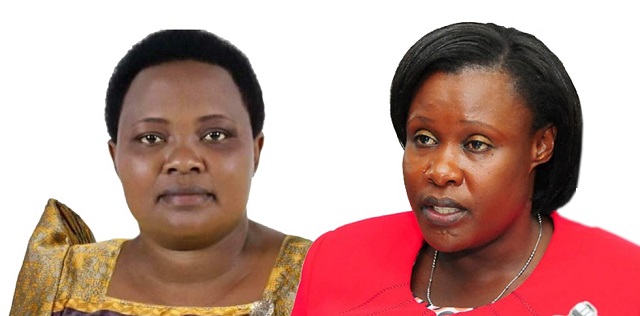
📌 KEY APPOINTMENTS
✳ Vice President ─ JESSICA ALUPO (MAJ.RTD)
✳ Prime Minister ─ ROBINAH NABBANJA
Kampala, Uganda | Isaac Khisa | Ugandan women parliamentarians are now blazing new marks in politics and governance to push for various legislative bodies to effectively represent citizens and respond to their needs.
Presently, Uganda has more than 173 women members of parliament out of 529 MPs in the new parliament following the concluded general elections. In addition, nearly half of the country’s 81 cabinet ministers including the top slots of prime minister and vice president are now occupied by women.
This is a total departure from the past parliaments in which majority of the top slots in cabinet were occupied by males.
“I am excited that the number of women in leadership has increased because we (FOWODE) have been doing some advocacy and drumming the fact that the number of women in leadership needs to increase,” said Ms Patricia Babiiha, the executive director at the Forum of Women in Democracy (FOWODE), a front liner in skilling women on political leadership.
“But, also, it is not about gender, but capability of women. Yes, numbers are important but what the women in these spaces are able to do is as important as the numbers .”
“We are also hoping that these women will use their respective positions to actually advance women’s issues as well as ensure lives of women in Uganda are transformed.”
This trend of women contesting and winning parliamentary elections has raised Uganda’s profile in the commonwealth member states among countries with most women members of parliament and ministers.
Latest data from the UN Women on women in politics 2021 shows that Kenya had 75 women MP’s out of the 347, Rwanda 49 women MPs out of 80 in the Lower House and Tanzania 141 out of the 384 elected MPs. Burundi had 47 women MPs out of 123 members of parliament.
In terms of ministerial postions, Rwanda had the most women ministers at 54.8% with 17 women ministers out of 31 ministers. Uganda, too, is expected to register an increase in terms of women ministers going forward compared to 36.7% in the previous parliament.
UN Women Executive Director Phumzile Mlambo-Ngcuka said: no country prospers without the engagement of women. We need women’s representation that reflects all women and girls in all their diversity and abilities, and across all cultural, social, economic, and political situations.”
She added: “… we still need bold, decisive action across the world to bring women into the heart of the decision-making spaces in large numbers and as full partners. There’s no doubt this can and should be done. It should be done now.”
Martin Chungong, Secretary General, the Inter Parliamentary Union (IPU) – an organization that brings together all parliaments in the Commonwealth countries globally said : “This year’s growth in the number of women in political decision-making is just not good enough.
Especially when you consider that 70 per cent of health, care, and service workers during this pandemic are women. It’s up to all of us, both men and women, to keep pushing for greater representation of women in politics. We have the tools to make it happen. What we need now is the political will.”
Women leaders promotes gender equality Studies indicate that women participation in politics promotes gender equality by challenging the existing social and political structures that perpetuate a culture of women’s subordination in both the private and public sphere.
“Women participation in politics promotes issues of women, curbs corruption, improves policy outcomes, and promotes the inclusiveness of minority groups in public spheres,” ,” said the 2017 United Nations Development Programme report titled ‘Gender equality and women’s empowerment in public administration.’
The report whose study was conducted in Uganda considers women as actors of development, encourages the integration of women in the labor market, and promotes economic and development growth.
The report, however, states that whereas Uganda has a good percentage of women parliamentarians, there exists numerous challenges.
For instance, the study notes that despite the enactment of the Domestic Violence Act (2010), gender- based violence perpetuated against women and girls is still rife estimated at over 60% by various studies.
“Such violence appears to be socially accepted and accompanied by a culture of impunity, the study notes.“ Maternal mortality is still amongst the highest in the region and the division of labour in the household still burdens women rather than men. This also applies to women employed in the Public Service, who have to combine public and private roles.
This, however, seem to be the trend in other Commonwealth countries across the globe. At the household level, the report says progress in the transformation of unequal gender roles has been relatively slow, due to persistent patriarchal attitudes and deep-rooted negative attitudes regarding the roles, responsibilities and identities of men and women in all spheres of life.
In addition, older women with disability suffer greater discrimination, poverty, stigma and isolation, gender-based violence and face obstacles in accessing justice.
In terms of jobs, the report notes that that in Uganda’s Public Service, men constitute 67 percent and women only 33 percent. This level of opportunities, however, does not match the representation of women in Uganda, where females are more than half of the country’s population.
It is therefore evident that the women parliamentarians will once again brings issues affecting women in their societies to the fore for more discussion in this new parliament.
These among others will include; promoting an equal representation of women and men in decision making processes at the national, regional and international levels, strengthening the advocacy skills of women leaders, employment, maternal and reproductive health and generally their wellness in society.
 The Independent Uganda: You get the Truth we Pay the Price
The Independent Uganda: You get the Truth we Pay the Price


